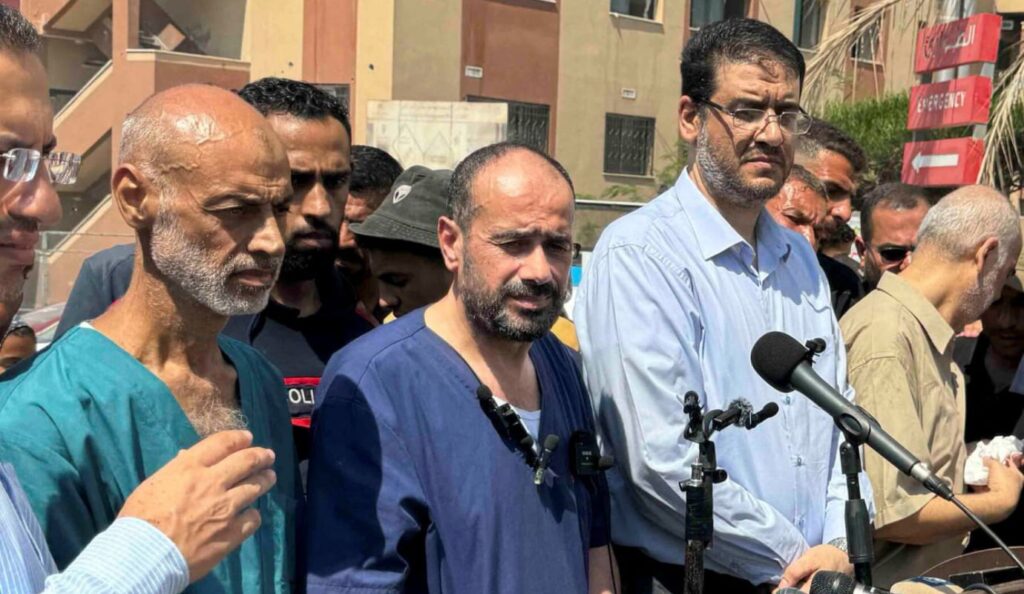The tragedy in Gaza continues with unrelenting intensity, as the director of Al-Shifa Hospital, Mohammad Abu Salmiya, experiences a nightmare. During his shift in the emergency department, he was called to receive the bodies of his brother and sister-in-law, victims of Israeli bombing. “I was shocked, devastated when I saw the bodies of my brother and his wife,” the doctor told AFP, describing the pain and uncertainty that dominates the region.
“Everything is possible now, receiving dead or wounded loved ones,” he added, expressing outrage over the continuing occupation crimes and the escalating tragedy in Gaza. Civil defense reported at least 87 deaths yesterday from Israeli strikes in the Gaza Strip, 70 in Gaza City.
According to the emergency relief organization, 11 victims lost their lives in Israeli strikes in the Sabra neighborhood. Al-Shifa Hospital reported receiving 34 bodies while the Baptist hospital received another 28.
The Israeli military did not immediately respond when AFP requested comment on these deaths.
Given the restrictions imposed on media in the Gaza Strip and access difficulties to the field, AFP notes that it cannot independently verify casualty figures and announcements from any side.
🚨 Dr. Mohammad Abu Salmiya, Director of Al-Shifa Hospital:
⭕️ My home was destroyed, family members killed without warning.
⭕️ Gaza City faces nonstop bombardment, no basic necessities.
⭕️ The world is watching millions face extermination in silence.#Gaza #Genocide #Palestine… pic.twitter.com/rcBe7dR9V5— Tabish Rahman (@Tabishtabi11) September 20, 2025
Al-Shifa Hospital, the largest in the Gaza Strip and among the few still operating in the small coastal enclave, receives daily casualties since the war erupted, triggered by an unprecedented raid by the Palestinian Islamist movement Hamas against the southern part of Israeli territory on October 7, 2023.
However the flow of casualties increased dramatically since the start, on September 16th, of the Israeli military’s ground offensive in Gaza City, with the declared goal of eliminating the Palestinian movement there.
Early yesterday morning, an ambulance entered the health facility compound with sirens wailing. Four bodies wrapped in white shrouds were placed under a tree, while another ambulance arrived with wounded, including a young boy.
“Death is more merciful,” sighed Mohammad Nasser, 38, a resident of the Tel al-Hawa neighborhood, his gaze fixed on the stream of residents fleeing to escape the bombings.
According to the Israeli military, about 480,000 residents of Gaza City have left since late August. Civil defense reported the day before yesterday a few tens of thousands fewer, 450,000 displaced.
Gaza: “My wife, my three daughters and I will wait until the last moment”
With some meager belongings on trucks, cars, donkey-drawn carts or on their backs, thousands of Palestinians take to the roads heading south daily. Exhausted, Mohammad Nasser said he has neither the strength nor the means to leave. “My wife, my three daughters and I will wait until the last moment.”
The Israeli military “wants to forcibly displace everyone to destroy Gaza City and make it a second Beit Hanoun or Rafah, uninhabitable for the next hundred years,” Mohammad Nasser estimated, referring to other communities in the enclave that have been transformed into ruins since the war began nearly two years ago.
Despite evacuation orders and bombings, many families refuse or are unable to leave. The journey costs dearly for some. Others say they don’t know or have nowhere to go.
Residents who left the city recounted that it took them over twelve hours to reach the southern areas designated by the Israeli military. Prices for the journey keep rising. Now some truck owners are asking $1,500 to $2,000 for the trip, according to testimonies gathered by AFP.
“We want to leave but we have no money,” said Raida al-Amarin, who woke up in the morning to the sound of explosions. “We don’t even have ten shekels to buy bread. What can we do? We’ll stay — either they’ll kill us or someone will find a solution for us.”
The Israeli military assures that departing residents will find food, tents and medicine in a zone it characterizes as “humanitarian” in al-Mawasi, in the south. However, this area, although presented as safe, has been bombed repeatedly, according to eyewitnesses and local sources, intensifying Gazans’ mistrust.




